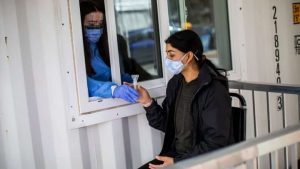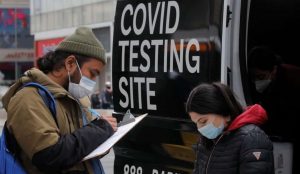Canada’s COVID-19 case rate now tops U.S. rate. Here’s what the experts say

The staggering COVID-19 case numbers in the United States may have seemed like a world away compared to Canada’s relative caseload for most of the pandemic, but recent statistics show the growing severity of the situation on this side of the border.
How to get a COVID-19 vaccine in the Greater Toronto Area — if you qualify
Friday, April 9 marked the first day since the early days of the pandemic in March 2020 that Canada averaged more confirmed cases per million people than the U.S.
The running graphic from Our World in Data — which uses statistics from Johns Hopkins University to juxtapose the seven-day average number of cases in both countries — showed that trend continuing on Saturday.
Experts say differences in the countries’ vaccine rollouts and the presence of more transmissible variants in Canada contributed to this situation, but context is critical when comparing what’s happening in both countries.
“Things are bad in Canada, I agree, but I think there’s a little bit of caveat to say, ‘We’re worse than the United States right now,’ without incorporating those pieces as part of the argument,” said Dr. Zain Chagla, an infectious disease physician and associate professor of medicine at McMaster University in Hamilton.
Chagla said that factors like testing behaviours in the U.S. and a higher rate of COVID-19 deaths per million in the U.S. are important to consider when assessing the situation. On April 9, when Canada recorded more cases per million, a graphic from Our World in Data showed the U.S. had 2.97 daily deaths per million on a seven-day average compared to 0.85 in Canada.
Epidemiologist Cynthia Carr says the data lines up with the Public Health Agency of Canada’s warning on Feb. 19, when the agency presented modelling that suggested variants would lead to a surge in coronavirus cases across the country without stricter health measures.
Canada reported 3,091 confirmed COVID-19 cases on Feb. 19 — while on April 9, the country recorded 9,243 cases, according to a CBC News tally.
“We didn’t react and we didn’t have the opportunity to roll out the vaccine program fast enough due to supply chain challenges,” said Carr, who founded EPI Research in Winnipeg.
The U.S. has outpaced Canada in terms of delivering vaccines in both total amount of doses given and on a per capita basis; as of Monday, Our World in Data shows that more than 35 per cent of the total U.S. population has received at least one dose, compared to just over 19 per cent in Canada.
As for cases, both Carr and Chagla suggested that the actual number in the U.S. is likely higher than the confirmed total, while Carr reiterated the impact of the more highly transmissible variants of concern in Canada.
“Canada is one of the only countries in the world to be dealing with all three [variants of concern] and again, the more than double [the number] of cases in less than two months shows the impact,” she said.
Herd immunity a factor in U.S.
While Chagla credited the U.S. for its “aggressive” vaccine rollout, he said what happened in hot spots like New York, Los Angeles and Houston also affects their situation.
Because those areas and other parts of the country had massive numbers of cases and deaths, Chagla said a byproduct in that context is the emergence of some herd immunity among survivors.

“So now you have a lot of people getting vaccinated, a good chunk of those who have never had COVID, and then you have a good amount of the population that’s already immune to COVID,” he said.
“As you start seeing those thresholds get bigger and bigger and bigger, you actually start seeing what herd immunity does: there is less chance of transmission and less people that are able to get sick with COVID-19 because they’ve already been sick or they’ve been vaccinated fully in that context.”
Even with Canada’s ongoing vaccination campaigns, Chagla said it’s going to take time to establish that level of population of immune people — partly because of the significant higher raw case total in the U.S.
“I mean, it’s a gift and a curse that we’ve had reasonable control of our COVID-19 pandemic throughout the last few months,” he said. “But the reality is there’s estimates of 25 per cent of Americans being infected at some point or another.
“In Canada, the figure is probably closer to the 10 per cent range, so we are nowhere near a population-based herd immunity.”








Redes Sociais - Comentários